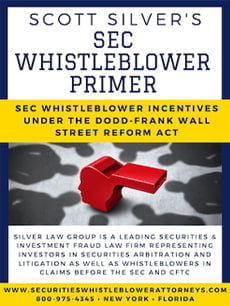What is Spoofing?
In a securities law context, “spoofing” is the practice of flooding a market with orders to buy or sell that are canceled before they go through. The goal is to manipulate the price of the security by artificially creating or depressing demand, which the spoofer can then use to make a profit. Spoofing is a felony under the Dodd-Frank Act of 2010. However, brokers and entities continue to employ it as a strategy; JP Morgan Chase & Co. paid a record-high penalty for it in late 2020, after being caught allegedly manipulating the prices of gold, silver and Treasury bonds.
Insiders with information about spoofing can “blow the whistle” on it, performing a public service while putting themselves in a position to earn a financial reward if the case is successful. The securities whistleblower attorneys at the Law Firm of David R. Chase and the Silver Law Group represent whistleblowers who are ready to report spoofing to the Commodity Futures Trading Commission or other regulators.
How Spoofing WorksSpoofing is placing large numbers of orders to either buy or sell a security, then cancelling them almost immediately. A trader who can take advantage of the small window of time in which the market price was manipulated can place orders on the opposite side of the market, reaping a profit. This is possible without computers, but particularly effective in algorithmic trading, where split-second decisions can be made without human intervention.
Spoofing was illegal before Dodd-Frank; the Commodity Exchange Act of 1936 (CEA) prohibits transactions that are “used to cause any price to be reported, registered, or recorded that is not a true and bona-fide price.” It also prohibits “false or misleading or knowingly inaccurate reports concerning… conditions that affect… the price of any commodity.” However, the CEA didn’t specifically define or forbid “spoofing,” and it permitted only civil penalties for violations of these provisions.
Dodd-Frank, by contrast, expressly makes spoofing a criminal offense, and defines it as “bidding or offering with the intent to cancel the bid or offer before execution.” Violations can earn the violator civil fines and regulatory actions. Knowing violations are felonies. This provision grew out of the economic downturn of the late 2000s, and it permits regulators to be more aggressive against spoofing.
You Can Make a DifferenceEvidence of intent is always helpful to regulators, but the language of the Dodd-Frank provision makes it even more helpful. If there is a record of traders openly discussing their intention to spoof the market—as there was in the record-high Chase case—it can help regulatory agencies, and perhaps federal prosecutors, show that they knowingly violated the Dodd-Frank anti-spoofing provision. This could lead to felony prosecution rather than mere fines, or larger penalties on the civil side.
For this reason, a whistleblower who can provide original evidence of intentional spoofing is likely to collect a financial award. Under the whistleblower program set up by Dodd-Frank, whistleblowers can collect 10% to 30% of the financial penalty against an entity that breaks securities law, as long as that penalty is more than $1 million.
There are other rules that must be followed before a whistleblower can collect this award—and there are even more rules if you want to keep your name out of it. If you’re considering blowing the whistle on spoofing or another unlawful trading practice, you should call the Silver Law Group and the Law Firm of David R. Chase for a free, confidential consultation. Our securities whistleblower attorneys represent people nationwide who want to come forward with important information about wrongdoing—but in a way that minimizes the risk to their careers and names and maximizes the chance of an award. To talk to us about your situation and your options, call us today at 800.975.4345 or send us a message through our website.
 Silver Law Group Home
Silver Law Group Home
